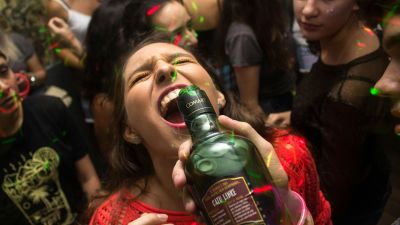Have you ever been completely gazeboed? German linguists find 546 'drunkonyms' in English language

After an extensive study it has been found at least 546 synonyms for the word "drunk" - dubbed "drunkonyms" - exist across the English language
By Lily Ford, ITV News Multimedia Producer
Have you ever been utterly gazeboed after one too many glasses of wine?
You also might have been carparked, trollied, or even pyjamaed, it turns out, after two German linguists took the claim of British comedian Michael McIntyre very seriously.
McIntyre once said during a stand-up show that posh Brits could use any word to mean "drunk" in the English language.
After an extensive study recently published in the Yearbook of the German Cognitive Linguistics Association, Professors Christina Sanchez-Stockhammer and Peter Uhrig found at least 546 synonyms for the word "drunk" - dubbed "drunkonyms" - across the English language.
The regular Briton will be familiar with the classics, such as "wasted" or "hammered". These ol' faithfuls have marked their territory at the top of the nation's favourite drunkonyms list.
But what about "fried", "toastered", or "sozzled"? Well, they're valid too, according to this study.
The professors discovered that "drunk" mainly occurs in the combinations "too", "so", or "very" drunk but unexpectedly, not with the kinds of adverb used by McIntyre.
By contrast, the drunkonyms ending in ‑ed (for example, "blasted" and "loaded") most often occur with the expected intensifiers "completely" or "totally" (like, "completely loaded").
As expected, the combination of "be" plus the intensifying adverb and the word ending in -ed is commonly used to refer to drunkenness, but not often enough to explain how language users understand new drunkonyms, they thought.
The linguists therefore provided an additional explanation: by the time English native speakers reach adulthood, they have most likely experienced so many different words ending in -ed meaning "drunk" that it allows them to interpret words with unknown meaning ending in -ed (such as "cabbaged") as "drunk" in many contexts.
This is how those 546 drunkonyms are explained.
Even though excessive alcohol consumption may come with negative consequences, drunkenness is commonly discussed using a wide range of light-hearted linguistic means in English, the study also found.
Professor Sanchez-Stockhammer observed: "The humorous effect of drunkonyms is often achieved through their indirectness."
What renders McIntyre’s examples "gazeboed" or "carparked" funny is that there is no obvious relation between the base (e.g. “gazebo”) and the meaning "drunk".
The English language also expresses drunkenness indirectly by shortening phrases like "blind drunk" and "nicely drunk" to the corresponding drunkonyms "blind" and "nicely".
"All this suggests that drunkonyms fit in well with English linguistic and humourous traditions”, Professor Sanchez-Stockhammer added.
Want a quick and expert briefing on the biggest news stories? Listen to our latest podcasts to find out What You Need To Know…